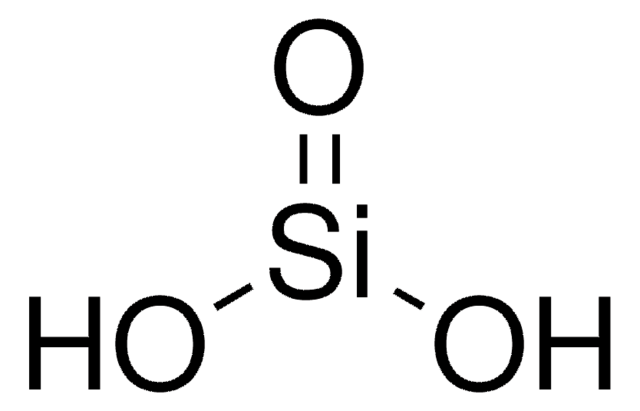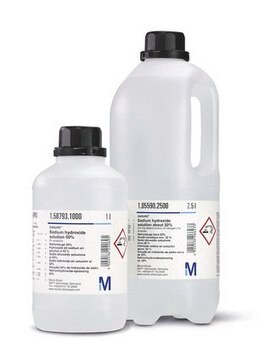306363
Silicic acid
powder, −80 mesh
Autenticatiper visualizzare i prezzi riservati alla tua organizzazione & contrattuali
About This Item
Numero CAS:
Numero CE:
Numero MDL:
Codice UNSPSC:
12352301
ID PubChem:
NACRES:
NA.21
Prodotti consigliati
Stato
powder
Livello qualitativo
Perdita
<16% loss on ignition
Dimensione particelle
−80 mesh
Stringa SMILE
O[Si](O)=O
InChI
1S/H2O3Si/c1-4(2)3/h1-2H
IJKVHSBPTUYDLN-UHFFFAOYSA-N
Cerchi prodotti simili? Visita Guida al confronto tra prodotti
Applicazioni
Silicic acid is a hydrophilic inorganic material that can be used as a zirconium phosphate additive to enhance proton conductivity in the inorganic-organic composite membranes. It can also be used as a binder for the electrodes of thermal batteries.
Codice della classe di stoccaggio
11 - Combustible Solids
Classe di pericolosità dell'acqua (WGK)
WGK 3
Punto d’infiammabilità (°F)
Not applicable
Punto d’infiammabilità (°C)
Not applicable
Scegli una delle versioni più recenti:
Possiedi già questo prodotto?
I documenti relativi ai prodotti acquistati recentemente sono disponibili nell’Archivio dei documenti.
I clienti hanno visto anche
Silicic acid polymerization catalyzed by amines and polyamines.
Mizutani T, et al.
Bulletin of the Chemical Society of Japan, 71(8), 2017-2022 (1998)
The Intimate Role of Imidazole in the Stabilization of Silicic Acid by a pH-Responsive, Histidine-Grafted Polyampholyte.
Demadis KD, et al.
Chemistry of Materials, 27(19), 6827-6836 (2015)
T I Nikoforova
Voprosy kurortologii, fizioterapii, i lechebnoi fizicheskoi kultury, (3)(3), 16-21 (2013-07-04)
This article is focused on the benefits of drug-free therapeutic technologies, such as the use of artificial general siliceous baths for the treatment of patients with arterial hypertension. This approach results in the anti-hypertensive effect simultaneous with the correction of
Li-Na Niu et al.
FASEB journal : official publication of the Federation of American Societies for Experimental Biology, 26(11), 4517-4529 (2012-08-04)
Traditional bone regeneration strategies relied on supplementation of biomaterials constructs with stem or progenitor cells or growth factors. By contrast, cell homing strategies employ chemokines to mobilize stem or progenitor cells from host bone marrow and tissue niches to injured
Tsuyoshi Yamamoto et al.
Journal of plant research, 125(6), 771-779 (2012-04-25)
Rice (Oryza sativa L.) is a typical Si-accumulating plant and is able to accumulate Si up to >10 % of shoot dry weight. The cell wall has been reported to become thicker under Si-deficient condition. To clarify the relationship between Si
Il team dei nostri ricercatori vanta grande esperienza in tutte le aree della ricerca quali Life Science, scienza dei materiali, sintesi chimica, cromatografia, discipline analitiche, ecc..
Contatta l'Assistenza Tecnica.











